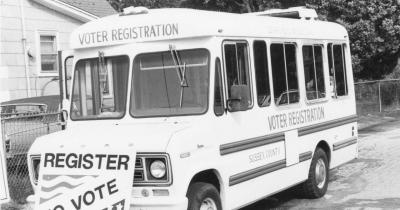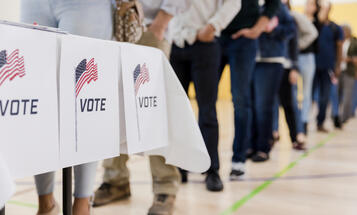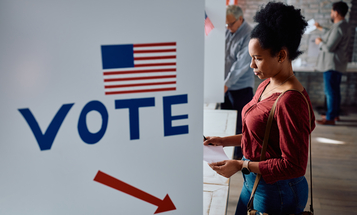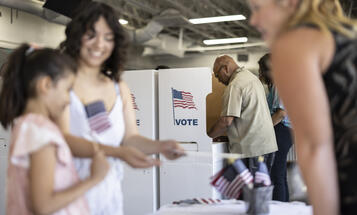
Demos Wins Court Order Blocking Indiana Voter Purge Law

Today, for the first time, a federal court told a state that its planned use of the controversial Interstate Voter Registration Crosscheck System (“Crosscheck”) to purge registered voters likely violates federal law.
In a major win for Indiana voters, U.S. District Judge Tanya Walton Pratt granted Demos’ motion for a preliminary injunction and blocked a new state law that would have allowed voters to be purged using Crosscheck immediately starting July 1. Crosscheck, the brainchild of Kansas Secretary of State Kris Kobach, purports to identify people who register and vote in multiple states. But its formula for matching voter registration records across more than half the states is fundamentally flawed, resulting in millions of people being falsely flagged as double registrants. According to a 2008 paper, finding different people with identical first names, last names, and date of birth—the only criteria Crosscheck uses to flag duplicate registrations, even when other information conflicts—is surprisingly common. What is not surprising is that Crosscheck is wrong an estimated 99% of the time. Once voters have been flagged under this flawed formula, they are then subjected to scrutiny and can be purged from the voter rolls.
At a time when states are dropping out of Crosscheck at an accelerating rate due to its inaccuracy and its significant security holes, Indiana has doubled down on its aggressive deployment of Crosscheck to purge voters. Under a law the state adopted last year, Indiana was set to begin purging voters on Crosscheck’s list of “Potential Double Registrants” without even first notifying them or giving them a chance to correct or verify Crosscheck’s information. If allowed to go into effect, the law would mean that many voters would not learn they had been purged until they showed up at the polls to vote. At that point, it would be too late.
Even in the 1% of cases where Crosscheck uncovers someone who really is registered in more than one state, Indiana’s use of Crosscheck would fail to adequately verify that the voter’s Indiana registration should be purged. The data Crosscheck provides make is impossible to determine the state where a voter has most recently registered. Indiana’s proposed purge program would cancel a person’s registration even though it might be the more current of the two.
Purging properly registered voters based on flawed information and without adequate safeguards is not only unfair, it also violates important federal voting rights protections embodied in the National Voter Registration Act of 1993 (“NVRA”). To stop this ill-conceived and unlawful purge program, Demos, representing Common Cause Indiana and working alongside the ACLU and the law firm Davis Wright Tremaine LLP, sued the state and sought a preliminary injunction to prevent the Indiana statute from going into effect while the court evaluates its legality. And today, the court issued that injunction.
In granting the preliminary injunction, Judge Pratt found that the way Indiana uses Crosscheck to purge voters likely violates the NVRA. Judge Pratt wrote that Crosscheck and the Indiana voter registration system are “unreliable because they do not collect or disseminate the actual voter registration documents, thereby depriving states of the opportunity to verify the conclusory data with the underlying documents.” The judge’s order prohibits the state “from taking any actions to implement” the new law until the lawsuit is resolved.
Crosscheck’s architect and primary proponent, Kris Kobach, served as vice-chair of the now-disbanded Presidential Advisory Commission on Election Integrity and is well known for leading the right’s charge to suppress the vote through unnecessary and burdensome restrictions on voting, such as photo ID and proof of citizenship requirements, and through aggressive purging of the voter rolls. Crosscheck is part and parcel of this voter suppression effort. Today’s decision dealt it a significant blow.
Guaranteeing the right to vote requires ensuring that voters who make the effort to register are able to cast a ballot and have it count. By preventing eligible and properly registered voters from participating in elections, voter purge tactics such as the one halted by Judge Pratt today undermine the right to vote and compromise the legitimacy and integrity of the democratic process. That is why Demos will continue to be at the forefront of the fight against unlawful and misguided voter purges and will continue to protect the right that is preservative of all other rights, the right to vote.




